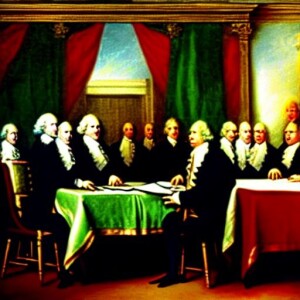Picture this: Philadelphia, September 1774. The air crackles with anticipation as twelve of the thirteen American colonies gather for a momentous event in history—the First Continental Congress. This pivotal gathering serves as a battleground of ideas, where delegates unite to confront the oppressive grip of the British government.
Tensions between the colonists and the British Crown have reached a boiling point. Grievances pile up like kindling, fueled by the weight of unjust taxation, the unwelcome presence of British troops, and suffocating trade restrictions. Enter the Congress, a bold response to these injustices, with delegates including luminaries like John Adams, George Washington, and Benjamin Franklin—architects of America’s destiny.
Within the hallowed halls of the Congress, minds clash and ideas ignite. Passionate debates rage, as the delegates forge a path forward. Their collective efforts result in the adoption of the Articles of Association, a clarion call for unity and resistance. This historic document not only calls for a boycott of British goods, but also lays the groundwork for a united front against the shackles of British tyranny.
The First Continental Congress stands tall as a cornerstone of cooperation, a turning point in the quest for independence. It sets the stage, like a theater curtain rising, for the grand spectacle of the American Revolution, which unfolds less than two years later. This Congress becomes the rallying cry, the spark that ignites a flame of defiance, and the birth of a united nation.
More than a mere political assembly, the Congress embodies the indomitable spirit of the colonists. It signifies their unwavering determination to assert their rights, to carve out a destiny of their own making. As the Congress takes its place in the annals of history, it not only serves as a catalyst for the formation of a national identity, but also lays the foundation for the birth of a new nation—one that resists, perseveres, and triumphs against all odds.

